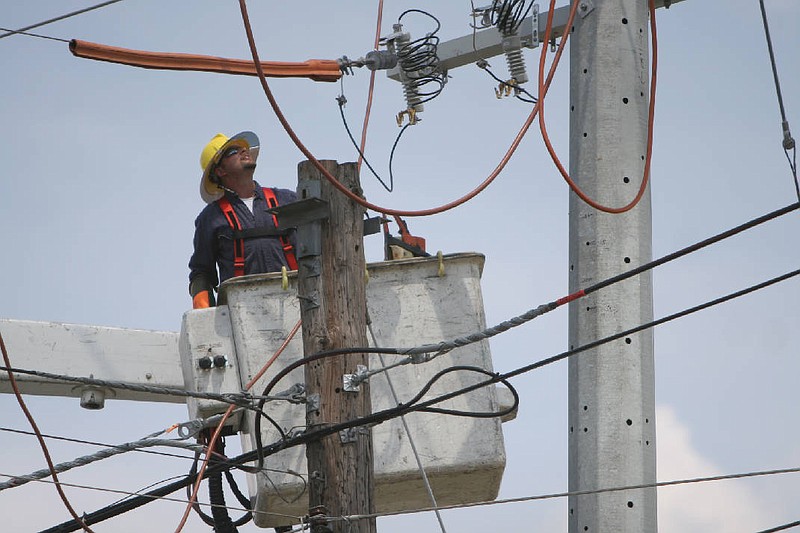Rural Hamilton and Bradley county residents hoping for high-speed Internet are going to have to keep waiting.
Due to the failure of the proposed municipal broadband expansion bill to gain support among key state House panelists, service providers such as EPB are currently unable to expand services to rural county residents due to territory limitations set by the state government.
For Rep. Mike Carter, R-Ooltewah, such limitations create a segmented Tennessee and relegate residents without broadband access - who in this case live right next to an area celebrated for its "gig" Internet connection - to a status of "second-class citizen[ship]."
What is broadband?
According to the Federal Communications Commission, "The term broadband commonly refers to high-speed Internet access that is always on and faster than the traditional dial-up access. Broadband includes several high-speed transmission technologies such as Digital Subscriber Line (DSL), Cable Modem, Fiber, Wireless, Satellite, Broadband over Powerlines (BPL)."
What that means for residents in areas not served by broadband is a premium price for Internet that doesn't come close to matching broadband speed. Residents in much of Ooltewah, Harrison and surrounding areas have limited - or no - access to affordable, high-speed Internet and are plagued by dead zones which have an impact not only on property values, but quality of daily life and access to educational opportunities for their children, they say.
Bill Perry, one of some 200 area residents who attended a community meeting about the desire and need for broadband expansion last October, said he pays $225 a month for Verizon Internet through a mobile hotspot, and another $120 a month for Dish satellite TV.
"We need EPB service," he said at the meeting. " That's a significant additional cost, especially if you go over [your limited data amount], which is easy to do when running five smartphones and a home computer from one device."
He added that his Web service is frequently slow, interrupted or stops working in bad weather.
EPB's Internet service costs $57.99 for unlimited data at a speed of 100 Mbps.
"I've got two boys: a sophomore and a senior at UTC. They can't do their homework at my house because it's all online," said Perry. "They had to move in with an aunt in Ringgold. Needless to say, that stinks."
For Bradley County resident Debby Williams, the lack of broadband availability meant taking a cut of more than $50,000 to her housing sale price. Once interested buyers realized high-speed Internet wasn't available, offers were revoked, she said at the same October meeting.
What's the complication?
The rules regulating electrical districts were formed prior to even the concept of the Internet.
"In order to provide electricity as quickly as possible, monopolies were granted to the local electric cooperative or provider," Carter explained in an email. "Strict rules were placed in effect that they could not exceed their boundaries. Those restrictions remain today."
EPB has said it's willing to extend service to outlying areas, some of which are a mile or less outside its designated electrical district, should the public utility receive permission to do so.
Until Carter took office, he said, he believed those boundaries should remain, to keep public enterprise from competing with private business. After learning more, he changed his mind.
EPB received and utilized a 50 percent matching grant from the federal government to create its fiber optic communication network, called the smartgrid system, and begin offering its 1-gig Internet option, which was created to provide enough power for the smartgrid system to be able to communicate effectively, said Carter. Since the service has already been funded, he now believes it makes sense to allow EPB to expand and offer it to residents with no similar access to this service.
He added that AT&T and other providers already receive government funding to service outlying areas that are off-limits to certain providers due to those old service territory agreements.
"[What] convinces me to back expansion of the EPB of Chattanooga is the fact that they received $111 million in stimulus funds, and in the next five years AT&T alone will receive $156 million of your money [in government funding] assessed every month on your bill to provide 10/4-gigabit service in those areas," Carter explained. "If the EPB's $111 million matching grant somehow disqualifies those benefits going to my constituents, how do I explain to them that AT&T is receiving non-matching funds?
"The issue then became, if it is necessary to create the world's fastest Internet system, why would EPB not offer that for economic growth in its service area?" Carter continued. " After I heard the story of the [gig's] creation and realized that the money had already been spent, I asked myself if I would allow a firmly held principle of no competition with private enterprise by government to deny my constituents and neighbors the incredible benefits."
If you feel passionately about this topic or would like to know more, Carter encourages contacting your local state representatives and senators as well as "Commissioner Randy Boyd of the Tennessee Department of Economic and Community Development, and particularly their local electrical carrier."
To find a list of state legislators and their contact information, visit capitol.tn.gov.
